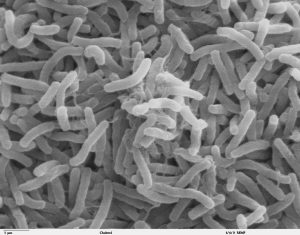NewsDesk @bactiman63
The Philippines Department of Health has reported a large increase in cholera cases through August this year.

http://remf.dartmouth.edu/images/bacteriaSEM/source/1.html
Based on the latest data, from January 1 to August 27, 3,318 cholera cases have been reported. This is a 271 percent increase compared to the same period in 2011 (894).
The Eastern Visayas (Biliran, Leyte, Eastern Samar, Northern Samar, Samar and Southern Leyte) accounted for two-thirds of the country’s total cases (2,208).
The National Capital Region (NCR) has seen the largest increase in cases as a percentage–3,500% (36 cases in 2022 vs 1 case in 2011).
The death toll due to cholera in 2022 to date is 29, up from four during the same period in 2021.
Cholera is an acute diarrheal illness caused by infection of the intestine with the bacterium Vibrio cholerae. Cholera is spread through contaminated food or water.
It usually takes 2-3 days for symptoms to appear after ingesting cholera bacteria, ranging from a few hours to 5 days.
Cholera can cause large amounts of watery diarrhea (described as a rice-water stool), nausea, and vomiting. Rapid loss of body fluids can lead to dehydration, shock, and even death.
- Dengue fever cases in Hanoi increased 4.5 times, Vietnam total tops 200K
- Escherichia coli O157 outbreak in Kyoto Prefecture, Japan
- Kenya: Multidrug resistant Klebsiella pneumoniae outbreak in newborns at Nairobi hospital
- Typhoid cases up 121% in the Philippines in 2022
- Taiwan local dengue cases double
- Mauritania reports four human Rift Valley fever deaths
- France local dengue transmission rises to 36 cases
- Panama: Dengue, malaria and leishmaniasis in the Metropolitan Health Region

